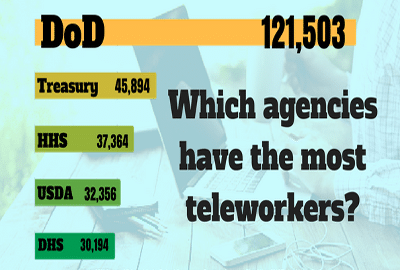
Teleworking: The Good, The Bad, The Ugly
More readers have their say about experiences with teleworking and whether or not they support the practice for government employees.
Like any work-related process involving human beings, teleworking has its fans and its foes.
Backers say it increases productivity, reduces sick leave usage, helps traffic and the environment and makes for happier workers who benefit from a work-life balance. Opponents say it reinforces a sense of entitlement, allows supervisors to play favorites, is easily abused by workers and erodes team building.
Generally people doing it think it is great. Those who cannot, do not or will not telework tend to believe it creates more problems than it is worth.
Earlier this week a number of feds — on both sides of the argument — had their say. One, who has a 200 mile daily commute said it is a life-saver and that she does more and better work from home. Other comments shared on the subject:
From “An employee who has definitely seen the dark side of telework”
“Many of your commenters seem to think that telework is necessary for work-life balance. While it is nice to supplement that, we as individuals need to take primary responsibility for ourselves. For instance, why have a job with a 200-mile commute and then blame your employer for a lack of work-life balance? Surely there are plenty of places to live a lot closer that could be chosen from to create your own work-life balance!
“My personal experience with teleworkers is this:
- An acquaintance who calls her weekly telework day her ‘day off’ and makes plans to run all her errands that day, including picking up her weekly dry cleaning.
- Another acquaintance who expects a bad-weather-day teleworker to ‘baby sit’ her child, in addition to caring for the teleworker’s own child, while the teleworker is supposedly working [when] school has been cancelled.
- Yet another acquaintance who takes his work computer everywhere with him. Granted, he does have his computer, and he is often typing away on it, but it appears he is only half working because he is engaged in other non-work activities at the same time.
“These are all federal employees from organizations other than my own. My own organization is very limiting in when and how we can telework. We have to indicate our location — [we] can’t be running errands, etc. — and we must have a product that we produce. And no one gets to telework on a routine basis, so we do still treat it with respect instead of looking at it as ‘my day off.’”
From Stephen in Northern Virginia, not a government employee
“I think I am still entitled to comment on the one daily struggle binding us all: traffic, specifically the commute. As Amazon sniffs around this region for its second headquarters and population projections predict that we will add another million people to this region by 2030, something will have to change.
“Metro will continue to expand, but overall, our investments in infrastructure have not even attempted to keep pace with population growth. Instead of widening I-66, the Commonwealth of Virginia slapped tolls on it instead. There will always be technical challenges associated with teleworkng, depending on the actual job and work involved, but as our commutes lengthen every year, teleworking may be one of the lowest hanging fruit we have to combat this growing challenge — a low hanging fruit that we can implement almost immediately. The Silver Line Phase II won’t be finished until 2020.”
From Roger J
“Teleworking definitely has its place in government and the private sector as well, but it needs to be watched very carefully. Personally I think that once employees take it for granted they are much, much more likely to abuse it and after a time to think they are entitled to it. I think bosses should monitor it very carefully so it is viewed as a plus-to-be-appreciated, not an entitlement. Trust me, I have seen it first hand. ”
Nearly Useless Factoid
By Amelia Brust
James Naismith, who invented basketball in 1891, was the sport’s first coach at the University of Kansas and is also the only coach in the team’s history to have a losing career record.
Source: KUSports.com
Copyright © 2024 Federal News Network. All rights reserved. This website is not intended for users located within the European Economic Area.
Mike Causey is senior correspondent for Federal News Network and writes his daily Federal Report column on federal employees’ pay, benefits and retirement.
Follow @mcauseyWFED
Related Stories





